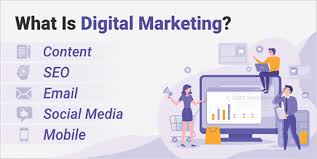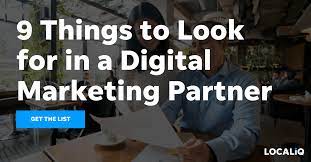Explaining Digital Marketing: A Comprehensive Guide
Digital marketing has become an integral part of modern businesses, revolutionizing the way companies promote their products and services. In this digital age, understanding the fundamentals of digital marketing is crucial for anyone looking to succeed in the competitive online landscape.
What is Digital Marketing?
Digital marketing encompasses all marketing efforts that utilize electronic devices and the internet to connect with potential customers. It involves various strategies and tactics aimed at increasing brand visibility, driving website traffic, generating leads, and ultimately converting those leads into customers.
The Components of Digital Marketing
Digital marketing consists of several key components that work together to achieve marketing goals:
- Search Engine Optimization (SEO): SEO involves optimizing a website’s content and structure to improve its visibility in search engine results. By implementing SEO techniques, businesses can increase organic (non-paid) traffic to their websites.
- Search Engine Marketing (SEM): SEM refers to paid advertising efforts on search engines. It involves running ads on platforms like Google Ads or Bing Ads, targeting specific keywords or demographics to reach potential customers.
- Social Media Marketing: Social media platforms provide an avenue for businesses to engage with their target audience directly. Through consistent posting, engaging content, and paid advertising campaigns, companies can build brand awareness and drive traffic to their websites.
- Email Marketing: Email marketing involves sending targeted emails to a list of subscribers who have shown interest in a company’s products or services. It is an effective way to nurture leads, build customer loyalty, and drive sales.
- Content Marketing: Content marketing focuses on creating and sharing valuable, relevant, and consistent content to attract and retain a specific audience. It can include blog posts, videos, infographics, and more.
- Affiliate Marketing: Affiliate marketing involves collaborating with other businesses or individuals who promote a company’s products or services in exchange for a commission. It is a performance-based marketing strategy that can expand brand reach.
The Benefits of Digital Marketing
Digital marketing offers numerous benefits that traditional marketing methods often struggle to match:
- Global Reach: With the internet connecting people worldwide, digital marketing allows businesses to reach a global audience without geographical limitations.
- Cost-Effective: Compared to traditional advertising channels like TV or print media, digital marketing is often more affordable and offers better return on investment (ROI).
- Targeted Audience: Digital marketing enables businesses to target specific demographics, interests, or behaviors, ensuring that their message reaches the right people at the right time.
- Data-Driven Insights: Through analytics tools and data analysis, digital marketers can gain valuable insights into consumer behavior and preferences. This information helps optimize campaigns for better results.
- Real-Time Results: Unlike traditional marketing methods that require time-consuming analysis, digital marketing provides real-time data on campaign performance. Marketers can make immediate adjustments based on this data.
The Future of Digital Marketing
The field of digital marketing continues to evolve rapidly as new technologies emerge. Artificial intelligence (AI), virtual reality (VR), voice search optimization, and chatbots are just a few examples of trends shaping the future of digital marketing.
Staying up-to-date with these advancements and adapting strategies accordingly is essential for businesses to remain competitive in the digital landscape.
Conclusion
Digital marketing has revolutionized the way businesses connect with their target audience, offering a wide range of strategies and tactics to drive brand awareness, website traffic, and conversions. Understanding the components and benefits of digital marketing is crucial for any business or individual looking to thrive in today’s digital world.
By embracing the power of digital marketing, companies can unlock new opportunities, reach a global audience, and stay ahead of the competition.
Essential Insights: Your Top 9 Digital Marketing Questions Answered
- What is digital marketing?
- How does digital marketing work?
- What are the different components of digital marketing?
- Why is SEO important in digital marketing?
- How can social media marketing benefit my business?
- What is the role of content marketing in digital strategies?
- Is email marketing still effective in the era of social media?
- How can I measure the success of my digital marketing campaigns?
- What are some common challenges faced in digital marketing?
What is digital marketing?
Digital marketing refers to the use of electronic devices and online platforms to promote products and services. It encompasses a wide range of strategies and tactics, including search engine optimization (SEO), social media marketing, email marketing, content marketing, and more. The goal of digital marketing is to connect with potential customers, increase brand visibility, drive website traffic, generate leads, and ultimately convert those leads into paying customers. In today’s digital age, understanding the fundamentals of digital marketing is crucial for businesses to effectively reach their target audience and stay competitive in the online landscape.
How does digital marketing work?
Digital marketing works by utilizing various online channels and strategies to connect with potential customers and promote products or services. It involves a combination of techniques such as search engine optimization (SEO), search engine marketing (SEM), social media marketing, email marketing, content marketing, and more. These methods aim to increase brand visibility, drive targeted traffic to websites, engage with the audience, and ultimately convert leads into customers. By leveraging data-driven insights and analytics tools, digital marketers can continuously optimize their campaigns for better results. The effectiveness of digital marketing lies in its ability to reach a global audience, target specific demographics, provide real-time results, and offer cost-effective solutions compared to traditional marketing methods.
What are the different components of digital marketing?
Digital marketing consists of various components that work together to achieve marketing goals. These components include Search Engine Optimization (SEO), which focuses on optimizing website content to improve visibility in search engine results. Search Engine Marketing (SEM) involves paid advertising on search engines to target specific keywords or demographics. Social Media Marketing utilizes platforms like Facebook and Instagram to engage with the audience and drive traffic. Email Marketing involves sending targeted emails to nurture leads and build customer loyalty. Content Marketing focuses on creating valuable content to attract and retain a specific audience. Finally, Affiliate Marketing involves collaborating with others to promote products or services in exchange for a commission. By utilizing these different components, businesses can create effective digital marketing strategies that drive brand visibility, website traffic, and conversions.
Why is SEO important in digital marketing?
SEO, or Search Engine Optimization, plays a vital role in digital marketing for several reasons. Firstly, SEO helps improve a website’s visibility and ranking in search engine results pages, leading to increased organic (non-paid) traffic. With the majority of online experiences starting with a search engine query, being present at the top of the results greatly enhances the chances of attracting potential customers. Secondly, SEO ensures that a website is optimized for search engines by improving its structure, content relevance, and user experience. This optimization not only helps search engines understand and index the website better but also enhances user satisfaction and engagement. Finally, SEO is cost-effective compared to paid advertising methods and provides long-term benefits by establishing a strong online presence. In summary, incorporating SEO into digital marketing strategies is essential for businesses to drive organic traffic, increase brand visibility, and achieve sustainable growth in the competitive online landscape.
How can social media marketing benefit my business?
Social media marketing can greatly benefit your business in several ways. Firstly, it provides a platform for direct engagement with your target audience, allowing you to build brand awareness, establish a strong online presence, and foster meaningful relationships with customers. Secondly, social media platforms offer powerful targeting options that enable you to reach specific demographics and interests relevant to your business, ensuring that your message reaches the right people at the right time. Additionally, social media marketing allows for cost-effective advertising campaigns compared to traditional channels, providing a better return on investment. By leveraging social media marketing effectively, you can drive website traffic, generate leads, increase conversions, and ultimately grow your business in today’s digital landscape.
What is the role of content marketing in digital strategies?
Content marketing plays a pivotal role in digital strategies by providing valuable, relevant, and engaging content to attract and retain a target audience. It involves creating and sharing various forms of content, such as blog posts, videos, infographics, and social media posts, with the aim of establishing brand authority and building trust with potential customers. Content marketing helps businesses connect with their audience on a deeper level, providing them with valuable information and solutions to their problems. By consistently delivering high-quality content, businesses can drive website traffic, generate leads, enhance brand visibility, and ultimately convert those leads into loyal customers. In the ever-evolving digital landscape, content marketing is an integral part of any successful digital strategy.
Is email marketing still effective in the era of social media?
The effectiveness of email marketing in the era of social media is a frequently asked question. While social media has undoubtedly gained immense popularity and offers a direct line of communication with customers, email marketing continues to be a highly effective strategy. Email marketing allows businesses to reach their target audience directly and deliver personalized messages. With careful segmentation and automation, companies can nurture leads, build customer loyalty, and drive conversions. Additionally, email marketing provides a more controlled environment compared to social media platforms, where algorithms and changing policies can impact the visibility of content. Therefore, incorporating email marketing alongside social media efforts can create a powerful combination for businesses to engage with their audience effectively.
How can I measure the success of my digital marketing campaigns?
Measuring the success of digital marketing campaigns is essential to understand their effectiveness and make data-driven decisions for future strategies. There are several key metrics to consider when evaluating campaign performance. These include website traffic, conversion rates, click-through rates (CTRs), engagement on social media platforms, email open and click-through rates, and return on investment (ROI). By analyzing these metrics, businesses can gain valuable insights into customer behavior, campaign reach, and overall campaign success. Additionally, using advanced analytics tools and tracking technologies allows for more precise measurement and optimization of digital marketing efforts. Ultimately, measuring the success of digital marketing campaigns enables businesses to identify areas of improvement, allocate resources effectively, and achieve their marketing goals.
What are some common challenges faced in digital marketing?
Digital marketing, despite its numerous benefits, comes with its fair share of challenges. One common challenge is the ever-changing digital landscape, where algorithms and platforms constantly evolve. This requires digital marketers to stay updated and adapt their strategies accordingly. Another challenge is the increasing competition for audience attention, as consumers are bombarded with an overwhelming amount of online content. Standing out and capturing their interest requires creativity and innovative approaches. Additionally, measuring the effectiveness of digital marketing campaigns can be challenging, as there are various metrics to consider and analyze. Lastly, data privacy concerns and the need to comply with regulations pose additional hurdles in digital marketing efforts. Overcoming these challenges demands strategic thinking, continuous learning, and a customer-centric approach to ensure success in the dynamic world of digital marketing.




